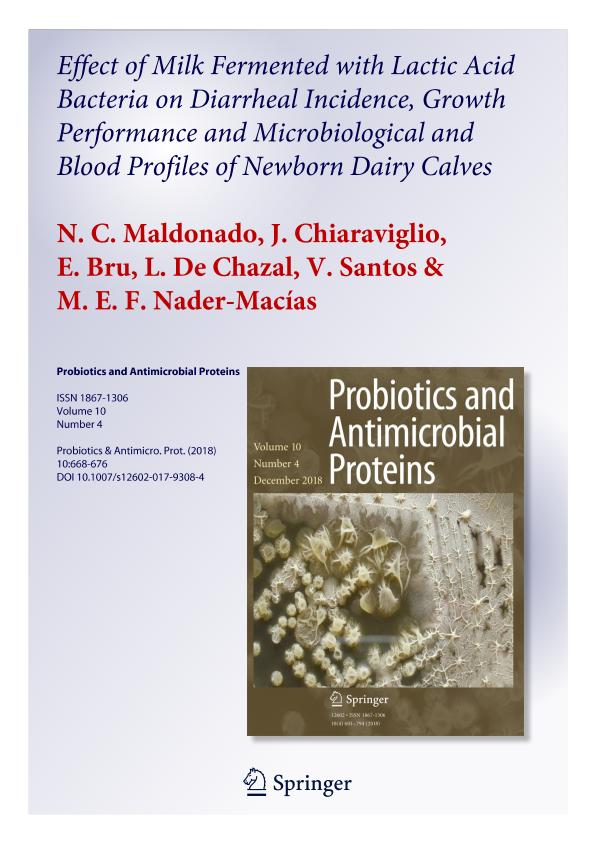Artículo
Effect of milk fermented with lactic acid bacteria on diarrheal incidence, growth performance and microbiological and blood profiles of newborn dairy calves
Maldonado, Natalia Cecilia ; Chiaraviglio, José; Bru Chauve, Elena Magdalena
; Chiaraviglio, José; Bru Chauve, Elena Magdalena ; De Chazal, Luis; Santos, Viviana; Nader, Maria Elena Fatima
; De Chazal, Luis; Santos, Viviana; Nader, Maria Elena Fatima
 ; Chiaraviglio, José; Bru Chauve, Elena Magdalena
; Chiaraviglio, José; Bru Chauve, Elena Magdalena ; De Chazal, Luis; Santos, Viviana; Nader, Maria Elena Fatima
; De Chazal, Luis; Santos, Viviana; Nader, Maria Elena Fatima
Fecha de publicación:
08/2018
Editorial:
Springer
Revista:
Probiotics & Antimicrob Proteins
ISSN:
1867-1306
e-ISSN:
1867-1314
Idioma:
Inglés
Tipo de recurso:
Artículo publicado
Resumen
The effect of the administration of milk fermented with lactic acid bacteria to calves was evaluated. The strains included were: Lactobacillus murinus CRL1695, Lact. mucosae CRL1696, Lact. johnsonii CRL1693, and Lact. salivarius CRL1702, which were selected for their beneficial and functional properties and isolated from healthy calves in the northwestern region of Argentina. The trial was conducted on a dairy farm located in Tucumán (Holando-Argentino calves). A randomized controlled trial was performed in which 56 new-born animals were divided into two groups: the treated group (T) received the fermented milk for 60 days and the control group (C) only milk. The animals were fed a solid diet ad libitum. The treated group was given a daily dose of 1 × 109CFU of the probiotic fermented milk while the control group was fed milk. Body weight and biometrical parameters were recorded between 15 and 60 days of age, and average daily gain was calculated with three samplings per animal throughout the trial. Rectal swabs and fecal and blood samples were also collected. Results showed the efficacy of the probiotic: lower morbidity and mortality of calves (morbidity was 69.20% in animals without the probiotic, and 46.15% in probiotic-treated animals, with P = 0.09; mortality in C was 34.61 and 7.69% in animals fed with ferment milk; P = 0.02).The calves fed with probiotic evidenced an improvement in nutritional parameters, body condition and weight gain (health index P = 0.01; average daily gain P = 0.03).Viable bacterial numbers showed no differences between the two experimental groups. Hematological parameters and serum proteins were not modified by the treatment. The results suggest that the fermented milk containing lactic acid bacteria can be a viable veterinary product for young calves due to its beneficial effects on health and growth.
Archivos asociados
Licencia
Identificadores
Colecciones
Articulos(CERELA)
Articulos de CENTRO DE REFERENCIA PARA LACTOBACILOS (I)
Articulos de CENTRO DE REFERENCIA PARA LACTOBACILOS (I)
Citación
Maldonado, Natalia Cecilia; Chiaraviglio, José; Bru Chauve, Elena Magdalena; De Chazal, Luis; Santos, Viviana; et al.; Effect of milk fermented with lactic acid bacteria on diarrheal incidence, growth performance and microbiological and blood profiles of newborn dairy calves; Springer; Probiotics & Antimicrob Proteins; 10; 4; 8-2018; 668-676
Compartir
Altmétricas



